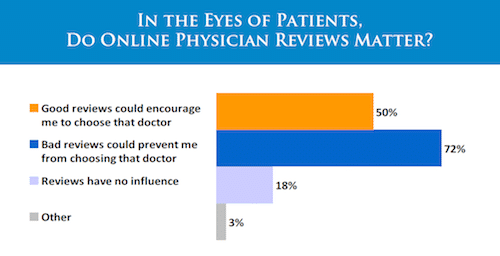How Your Online Doctor Reputation Can Make or Break Patient Choices
 Healthcare’s new breed of informed consumer—today’s prospective patient—is making important decisions about choosing a provider long before your office phone rings for an appointment.
Healthcare’s new breed of informed consumer—today’s prospective patient—is making important decisions about choosing a provider long before your office phone rings for an appointment.
Physicians and marketing professionals understand that the early competitive battleground for attracting new patients has gone digital, where online reputation is more important to consumers than your 12-page Curriculum Vitae.
Internet information is the first tool of choice for more than seven out of 10 users looking for health information. And as prospective patients adopt typical “online shopping” behavior, their buying decisions—primarily their selection of a doctor or hospital—is strongly influenced by online resources, in particular, doctor reviews.
Indicative of this pattern is Local Consumer Review survey data from BrightLocal where online reputation “matters most” for doctors and dentists--more so than all other local businesses. In the same survey, many consumers are willing to trust online reviews as much as they trust personal recommendations. [2013 and 2014 BrightLocal]
What patients say online about doctors, in reviews, critiques and comments, has become highly influential, much as consumers are guided by buyer comments and reviews of products, restaurants or cruise ship experiences.
How reviews influence patient behavior…

About “eight out of 10 [respondents] said that online reviews influence their willingness to be treated by a doctor,” according to the Digital Assent Online Patient Reviews survey. When patients were asked how their opinions and behavior are affected by online ratings for doctors, survey responders revealed:
- Eighty-two percent of patients said that online reviews influence their willingness to be treated by a doctor.
- Fifty percent believe that a doctor’s online reputation is worth considering, if they have at least 10 reviews.
- Eighty percent of patients reported that an average rating of four stars or better was ‘good enough’.
- Eighty-five percent said they would not be comfortable selecting a doctor if more than ten percent of their reviews had a one-star rating.
- Seventy-five percent of patients feel that reviews lose credibility if they are more than 12 months old.
Reviews are facilitated by the Internet, but the principle of influence and persuasion at work here is know as Social Proof—where people find validation for their choice or decision from observing others.
Revenue impact: new patients and pay-for-performance
Like it or not, online reviews are an important part of the ongoing competition among medical practices. For many, that influence directly effects their ability to attract new patients. In addition, patient satisfaction is becoming a factor in healthcare reimbursements and compensation for employed physicians.
RELATED READING: See our previous posts, Online Patient Reviews: Power, Influence and Muscle to Grow Even Bigger, and Fight, Flight or Listen: 3 Ways to Deal with Physician Reviews & Negative Patient Comments.
Related Articles:
Online Patient Reviews: Power, Influence and Muscle to Grow Even Bigger
Study: What Patients Expect From Your Doctor Review Site
Protecting Your Reputation: Doctors Who Ignore Social Media Are at Risk
Beware of These 6 Reputation Management Mistakes Most Doctors Make
Your Sterling Online Reputation and Six Best Practice Ways to Make It Better









